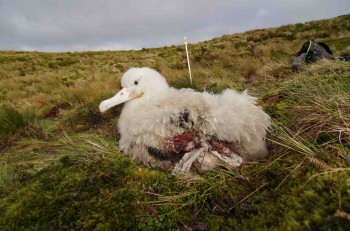As in previous years two complete-island censuses have been undertaken this year of breeding Tristan Albatrosses Diomedea dabbenena on World Heritage Site Gough Island. This Critically Endangered albatross is threatened with extinction by predatory attacks by Gough’s ‘killer” House Mice Mus musculus, as well as by longline mortality at sea.
In January this year field researchers Chris Bell and Mara Nydegger counted a total of 1748 incubating birds using scan counts from vantage points. This month a team led by Peter Ryan of the University of Cape Town’s Percy FitzPatrick Institute repeated the survey, counting 578 large chicks. This represents (so far) a breeding success of only 33.1%, far too low to sustain a population of great albatrosses. During the chick count graphic photographic evidence of wounds from mice on still-living chicks was obtained. Earlier, birds wounded by mice at night have been filmed succumbing to attacks by Southern Giant Petrels Macronectes giganteus the next morning.
Last year’s figures were 1421 incubators and 482 chicks, reflecting a smaller cohort for this biennially-breeding species, but a similar (and low) breeding success of 33.9% (click here).
Search on “Gough Tristan Albatross” on this web site to read earlier stories on the plight of Gough's Tristan Albatrosses – and of developing plans to eradicate the island’s mice.

A Tristan Albatross severely wounded by alien mice on Gough Island in 2012
Photograph by Karen Bourgeois and Sylvain Dromzee
Research on ACAP-listed species on the outer islands of Tristan da Cunha is funded by the UK's Overseas Territories Environment Programme and the Darwin Initiative Programme via the Royal Society for the Protection of Birds and by the FitzPatrick Institute, University of Cape Town. It is conducted with the support and approval of the Tristan Conservation Department and the logistic support of the South African Department of Environmental Affairs.
John Cooper, ACAP Information Officer, on Gough Island, 27 September 2013

 English
English  Français
Français  Español
Español